The world No. 1 USWNT has ordered up another shot, as forward Trinity Rodman — one-third of 2024’s Triple Espresso frontline alongside Mallory Swanson and Sophia Wilson (neé Smith) — returns to head coach Emma Hayes’s 24-player roster ahead of April’s Olympic rematch friendlies against silver medalists No. 8 Brazil.
After leading the USWNT’s attack throughout last summer’s gold-medal run, Rodman is the first of the trio to resume her place on Hayes’s lineup, and her return should bolster a US side looking to balance chemistry-building alongside continued rotation.
"I have to try and find the sweet spot in camp, to reintegrate her back in the team, but also to manage her, because she has a long season ahead," Hayes said of the Washington Spirit star.
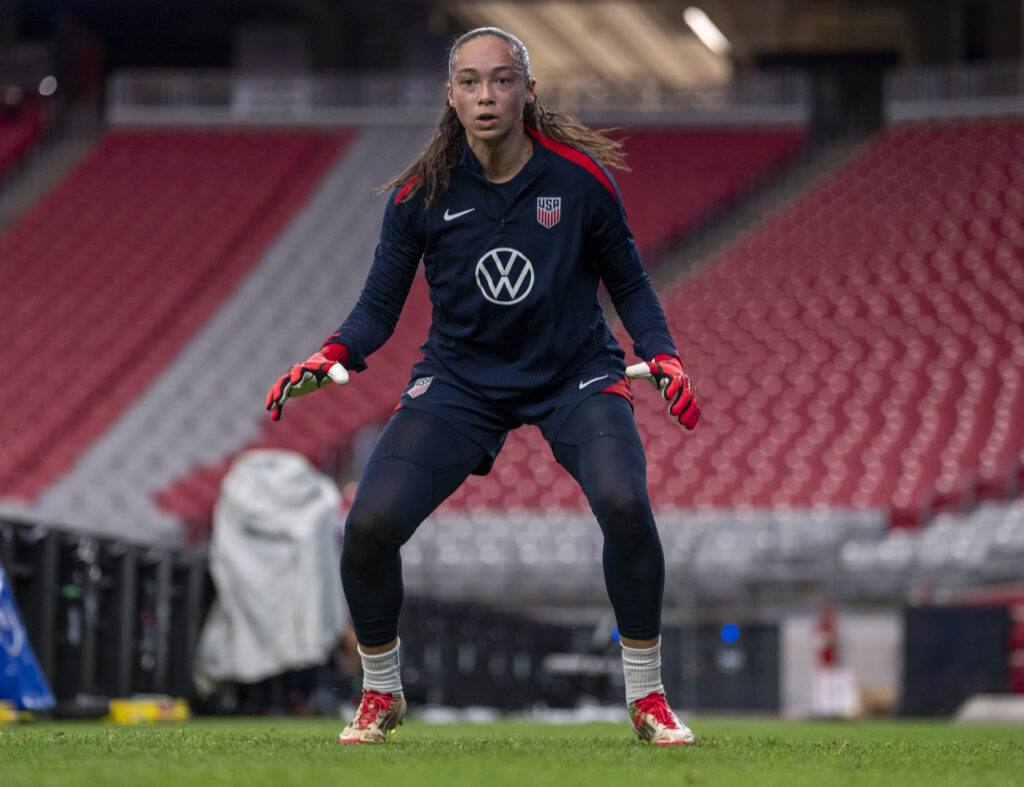
Hayes continues to tap fresh USWNT faces
April’s international window will allow Hayes to continue to size up less experienced players on the USWNT roster bubble, furthering a lengthy and deliberate evaluation process that began at the start of 2025.
With USWNT veterans Naomi Girma, Rose Lavelle, and Lynn Biyendolo (neé Williams) still unavailable due to injury, Hayes made room for first-time official invitees Houston Dash defender Avery Patterson and Manchester United goalkeeper Phallon Tullis-Joyce.
The US has seen Hayes’s process hit both highs and lows since returning from last winter's European friendly tour, with the team most recently taking second place at this year’s SheBelieves Cup.
That narrow SheBelieves loss to No. 5 Japan is still the only one on Hayes's USWNT resume. While always hunting wins, the US boss is playing the long game, focusing on creating what she hopes will be a 2027 World Cup-winning team.
"All of the players know they have to earn every roster spot, every starting spot and every minute they get as a finisher off the bench," Hayes said in a statement. "Working with players who are striving for consistency in elite performance, so they can keep getting call-ups and keep excelling at this level, is an exciting process and one that continues with [April's] two games."
The USWNT will take on Ireland and another opponent
— Just Women’s Sports (@justwsports) March 24, 2025June 26 in Commerce City, CO vs Republic of Ireland
June 29 in Cincinnati, OH vs Republic of Ireland
July 2 with an opponent and venue to be announced pic.twitter.com/z4OoILObXz
USWNT adds June friendlies against Ireland
The April roster drop arrives alongside a couple of schedule additions, with the US set to host the world No. 26 Republic of Ireland for two friendlies this June.
The teams will first square off in Commerce City, Colorado, on June 26th, before closing out the series in Cincinnati, Ohio, on June 29th.
"Ireland is one of the most difficult European teams to play against, so I’m happy we could get these games," remarked Hayes. "We need to play teams that will push us and create an environment where our players have to solve problems and play under pressure."
A third summer matchup is also on the horizon for July 2nd, though both the opponent and venue are yet to be determined.
The USWNT's April roster
- Goalkeepers: Jane Campbell (Houston Dash), Mandy McGlynn (Utah Royals), Phallon Tullis-Joyce (Manchester United)
- Defenders: Alana Cook (Kansas City Current), Tierna Davidson (Gotham FC), Crystal Dunn (Paris Saint-Germain), Emily Fox (Arsenal FC), Tara McKeown (Washington Spirit), Avery Patterson (Houston Dash), Emily Sams (Orlando Pride), Emily Sonnett (Gotham FC)
- Midfielders: Korbin Albert (Paris Saint-Germain), Sam Coffey (Portland Thorns FC), Lindsey Heaps (Olympique Lyon), Claire Hutton (Kansas City Current), Jaedyn Shaw (North Carolina Courage), Lily Yohannes (Ajax)
- Forwards: Michelle Cooper (Kansas City Current), Ashley Hatch (Washington Spirit), Catarina Macario (Chelsea FC), Trinity Rodman (Washington Spirit), Yazmeen Ryan (Houston Dash), Ally Sentnor (Utah Royals), Alyssa Thompson (Angel City FC)
How to watch the April friendlies between the USWNT and Brazil
Kicking off the series in LA, the USWNT will first host Brazil at 5 PM ET on April 5th, with live coverage on TNT.
The second match in San Jose is set for 10:30 PM ET on April 8th, and will air on TBS.
FIFA confirmed that the inaugural Women’s Club World Cup will now kick off in 2028, officially delaying its original 2026 launch this week.
Instead, soccer's world governing body will introduce a new Champions Cup next year, with FIFA ratifying both events on Wednesday.
The alternate Champions Cup will be a smaller, six-club affair with winners from regional tournaments like the UEFA Champions League and Concacaf Champions League.
FIFA plans to make the Champions Cup an annual event set for every year that does not include the quadrennial Club World Cup.
While worldwide club tournaments are an exciting prospect, a crowded schedule, lack of secured funding, and little news of the proposed 19-team Club World Cup’s development prompted timing concerns as 2026 rapidly approaches.
Now kicking off in early 2028, the Club World Cup will initially begin with six top clubs representing the AFC, CAF, Concacaf, CONMEBOL, the OFC, and UEFA. Those teams will take part in the play-in stage, where three winners will advance to the group stage.
Those three clubs must then contend with five directly qualified UEFA teams, plus two direct qualifiers each from CAF, CONMEBOL, AFC, and Concacaf.
While demand for increased global programming is spreading, FIFA’s delay underlines the logistical hurdles of creating new competitions — not to mention the strain they can cause athletes.
"FIFA needs to involve its stakeholders, like the NWSLPA and NWSL, for an event like this to reach its potential," NWSL Players Association executive director Meghann Burke told ESPN on Wednesday.
"Otherwise, they are hamstringing women's football yet again like they've done since time immemorial."
UK takes aim at 2027 FIFA World Cup
In other international soccer news, the UK announced Wednesday that the country is preparing a bid to host the 2035 FIFA World Cup, with England, Scotland, Wales, and Northern Ireland joining forces in an attempt to bring the sport’s biggest event to the United Kingdom.
England’s track record should make the bid particularly attractive after hosting the 2022 Euro to record-shattering attendance and global viewership success — and seeing the home side emerge victorious in the Lionesses first-ever major tournament win.
"Football is and always will be at the core of our country’s identity," said UK Prime Minister Keir Starmer, throwing the government's full support behind the bid.
"That pride was on full display when England hosted the Women’s Euro 2022. It not only showed the best of our nation to the world but inspired a generation of girls into the game, all whilst boosting the economy."
Should FIFA ultimately award the 2035 hosting duties to the UK, that tournament will mark the first World Cup hosted by the nation since the men's 1966 edition.
With Brazil set to host the 32-team 2027 World Cup and the US expected to lead a serious bid for the expanded 48-team 2031 edition, the FIFA Council officially recommended this week that either African or European nations serve as host for 2035.
The world No. 1 USWNT will take on familiar foe No. 17 China PR in a pair of late spring friendlies, with US Soccer announcing matchups scheduled for May 31st in St. Paul, Minnesota, and June 3rd in St. Louis, Missouri, on Monday.
The games follow two California-hosted friendlies against No. 7 Brazil, set to be played during FIFA’s early-April international break.
The USWNT has a deep competition history against China, having faced the Steel Roses 60 times —more than any country other than No. 6 Canada. China also boasts the second-most US defeats with nine, though they haven't upended the USWNT since 2015.
In total, the US boasts a 38-9-13 all-time record against their longtime rival, including arguably the team's most famous victory: the history-making penalty-kick win in the 1999 World Cup final at the Rose Bowl.
"I love these games because they combine some rich women’s soccer history with the present, with both countries going through transitions in preparation for '27 World Cup qualifying," said USWNT head coach Emma Hayes about the upcoming friendlies in the federation's announcement.
Friendlies to test young USWNT players
The new calendar additions will provide Hayes yet another chance to try out less experienced players — a strategy that saw a particularly youthful USWNT take second place at February’s SheBelieves Cup.
"Our process continues and it’s a patient and comprehensive one," Hayes explained. "It’s up to our coaching staff to give players opportunities — opportunities they have earned — and it's up to the players to show us they can perform at the highest levels."
The US will also honor a recent history-maker at the June 3rd match, as the team officially celebrates St. Louis product and former USWNT captain Becky Sauerbrunn, who hung up her boots in December.
Across her 16-year professional career, the star center back helped the US win back-to-back World Cups in 2015 and 2019, a 2012 Olympic gold, and eight straight Concacaf championships.
The two China friendlies will also continue the USWNT's 2025 trend of facing non-European teams, due in large part to Europe's long 2025 UEFA Nations League schedule, which spans multiple international breaks and takes priority over overseas friendlies.
While Europe ramps up for a continental battle at this summer's Euro, the USWNT will continue down the long road to 2027 — a road that provides plenty of time to develop budding superstars while paying homage to the success of prior generations.
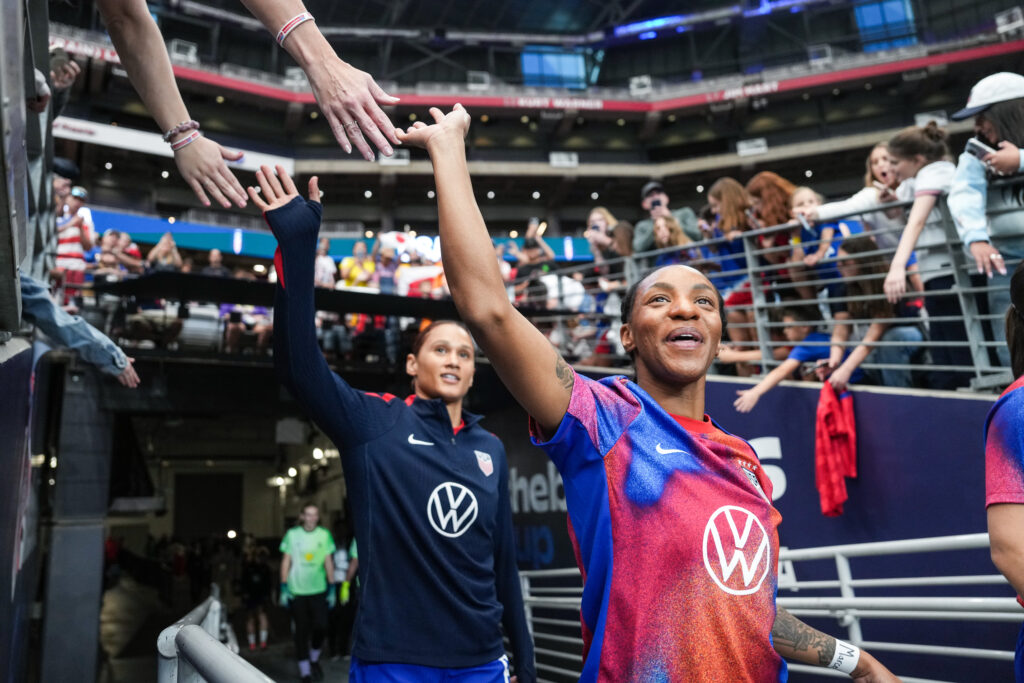
How to buy tickets to see the USWNT vs. China PR friendlies this summer
Tickets for both upcoming friendlies against China are available now via presale, with general sales opening at 11 AM ET on Friday.
The May 31st St. Paul match will kick off at 5:30 PM ET, with live coverage on TBS. St. Louis's game is set for 8 PM ET on June 3rd, and will air on TNT.
The first matchday of the 2025 UEFA Nations League tournament saw a few regional heavy-hitters shaking off the dust on Friday, with reigning Euros champs England settling for a 1-1 draw against Portugal while perennial contenders Germany similarly split points with the Netherlands after a 2-2 result.
Snagging an early lead for the Lionesses was forward Alessia Russo, who slotted in a ball from right-back Lucy Bronze in the match's 15th minute.
Unfortunately for England, however, Portugal extended their undefeated streak to 11 games after attacking midfielder Kika Nazareth scored a top-corner equalizer at the 75th minute mark to clinch the draw.
Germany and the Netherlands, who claimed third- and fourth-place, respectively, in the tournament's inaugural 2023/24 edition, opened their 2025 campaigns with a back-and-forth battle on Friday.
After Dutch star Lineth Beerensteyn opened scoring by nutmegging German net-minder and 2024 NWSL Goalkeeper of the Year Ann-Katrin Berger in the 13th minute, Germany closed out the first half with an extra-time header from Lea Schüller to level the score.
The second half saw the Germans pull ahead thanks to a 50th-minute strike from Sjoeke Nüsken, before Beerensteyn again broke through with the match's final goal in the 66th minute.
After the match, new head coach Christian Wück, who took over the German team last March, told reporters, "We need to learn to maintain our focus, especially after taking the lead. It’s frustrating to draw after putting in such strong efforts."
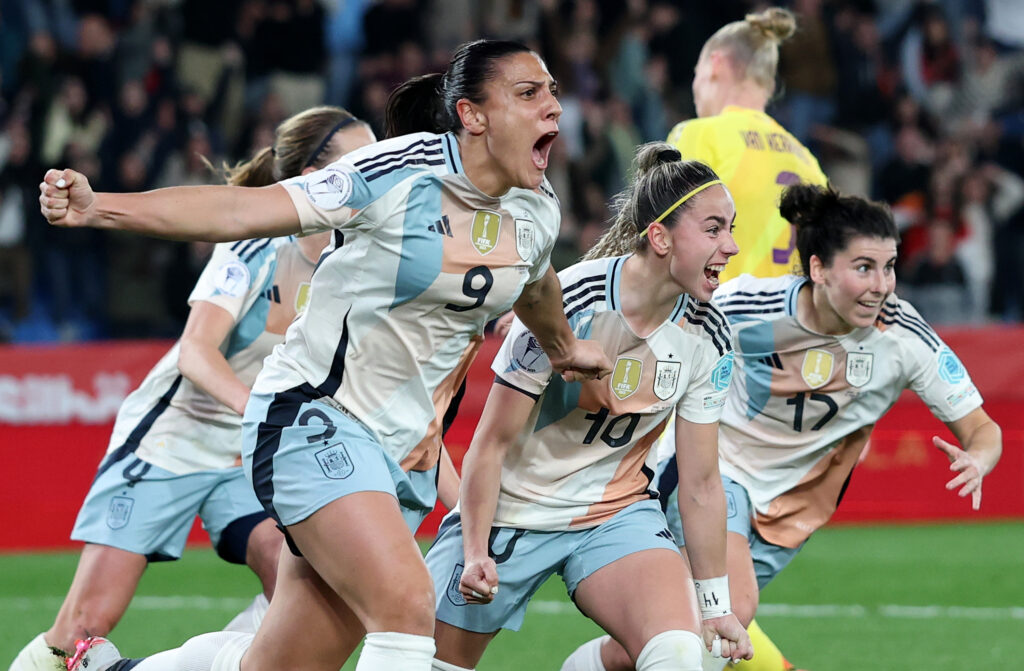
Reigning champion Spain rallies for late comeback victory
Draws aside, defending Nations League winners Spain earned perhaps the wildest victory of the opening matchday, surging back from a 2-0 deficit against Belgium to claim all three points in a 3-2 finish.
The 2023 World Cup champions fell behind early after striker Mariam Toloba gave Belgium the edge in the game's 18th minute. Forward Tessa Wullaert doubled that lead in the 72nd minute, seemingly putting an emphatic end to Spain's hopes of a victory.
Clàudia Pina clawed one back for La Roja just five minutes later, but it took a pair of stoppage-time goals from Lucía García and late call-up Cristina Martín-Prieto to secure the literal last-second win.
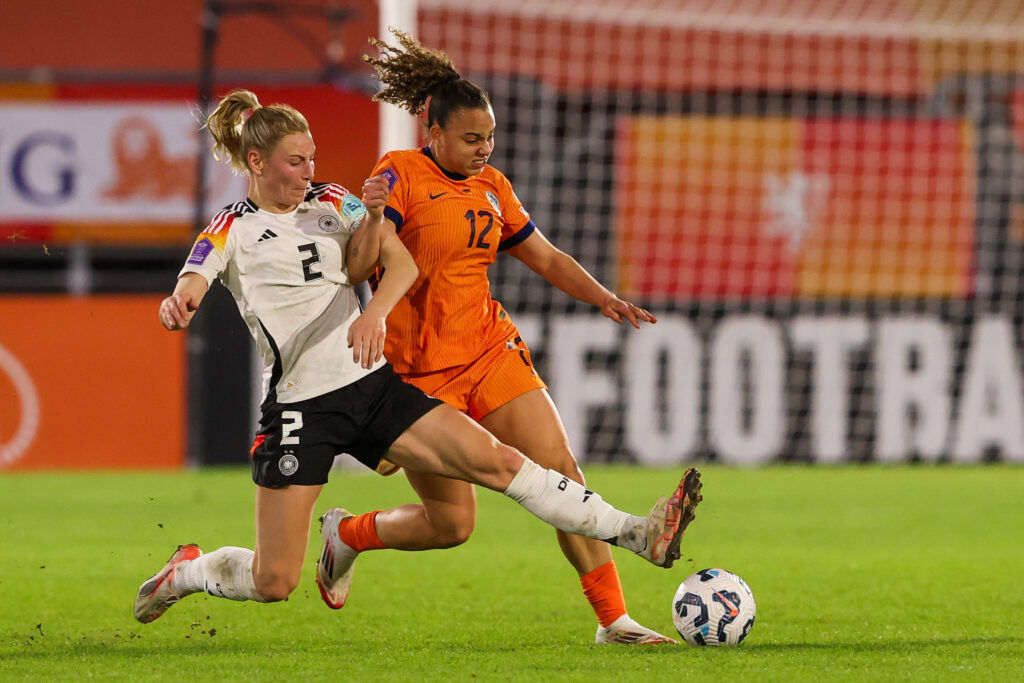
Nations League to set up UEFA's 2027 World Cup qualifying
Established in 2022, the Women’s Nations League is now the continent’s qualifying tournament for the Euros, World Cup, and Olympics.
With records wiped following last year’s rollercoaster Olympic qualifiers, early Nations League matches now serve as a key window into the fast-approaching 2025 Euros — in addition to a heated competition in their own right.
On top of that, the outcome of this second-ever edition of the contest will determine teams' positioning for the 2026 European qualifiers for World Cup. Put simply, the finishing spots teams snag after 2025 Nations League play will determine their league paths to claiming one of UEFA's 11 available spots in the 2027 World Cup.
While there's a lot on the line, there's also a significant amount of action still to come. With four teams in each League A group, squads will play three round-robin home-and-away fixtures to determine their final group-play standings — meaning each of Friday's games have a rematch on the calendar before the stage ends on June 3rd.
The winners of the four League A groups will ultimately meet in the two-leg Nations League semifinals in October, with the two-leg third-place play-off and a final set for November and December.
The 2027 Women's World Cup has officially claimed its calendar spot, with FIFA announcing Tuesday that the tournament's Brazil-hosted 10th edition — the first-ever in South America — will run from June 24th through July 25th.
"The FIFA Women’s World Cup Brazil 2027 is already taking shape and we can’t wait for the opening match," said FIFA president Gianni Infantino.
Looking to break 2023's record-setting attendance and viewership numbers, Infantino also noted, "This historic tournament will have a massive impact not only in South America, but around the whole world, taking the women's game to the next level in terms of participation and popularity."
Prepping for the 2027 World Cup qualifiers
The international soccer governing body also allocated the competition's 32 available spots, with CONMEBOL's Brazil earning automatic entry as one of the three slots granted to the continental confederation.
UEFA leads the pool with 11 teams, followed by AFC with six, CAF and Concacaf with four each, and OFC's one.
The final three squads will be determined by a 10-team, two-round play-in tournament taking place in late 2026 and February 2027.

The road to Brazil kicks off in 2025
With details including host cities and venues still to come, the road to the 2027 World Cup is ramping up with qualifying matches looming just around the corner.
Next year's UEFA Nations League play will determine the 11 European teams bound for Brazil, including 2023 world champions Spain. Meanwhile, the path to a fifth star for the world No. 1 USWNT crest begins with Concacaf W Qualifiers in late 2025.
Similarly, 2025 qualifying matches for the 2026 AFC Asian Cup and 2026 Africa Cup of Nations kicks off World Cup entrances for teams in those federations. CONMEBOL will look to the 2025 Copa América tournament to determine the remaining two entrants that will compete alongside host Brazil, while OFC is likely to set their World Cup qualifying matches for next year.

Superstar exits pave the way for new World Cup stars
Both expected and surprise entrants will book their 2027 World Cup spots over the next two years, but the Brazil tournament's sidelines are already set to feature fresh faces after a flood of soccer greats called game in 2024.
The host nation will compete in their first World Cup since 1999 without legendary attacker Marta, whose 17 goals lead the tournament's all-time scoring list.
Canada is suffering the same fate with 2027 marking the first edition in 28 years without leading international goalscorer Christine Sinclair.
Two-time trophy-winners Germany — the only team other than the US with more than one world title — recently bid adieu to star Alexandra Popp, who retired as a four-time World Cup competitor.
As for the USWNT, they'll look to follow their 2024 Olympic gold medal with a 2027 World Cup title, but without star striker Alex Morgan, defender Kelley O'Hara, or goalkeeper Alyssa Naeher, who followed 2023 retirees Megan Rapinoe and Julie Ertz out the door this year.
In a clash between the world's best, the No. 1 USWNT will face No. 2 England for the first time in two years on Saturday, kicking off in front of more than 80,000 fans at London's iconic Wembley Stadium.
The first of the USWNT's final two games of 2024, Saturday's US lineup will be without "Triple Espresso" forwards Mallory Swanson, Sophia Smith, and Trinity Rodman.
The team will also will begin the process of replacing legendary goalkeeper Alyssa Naeher, who announced earlier this week that this international window will be her last in at US kit.
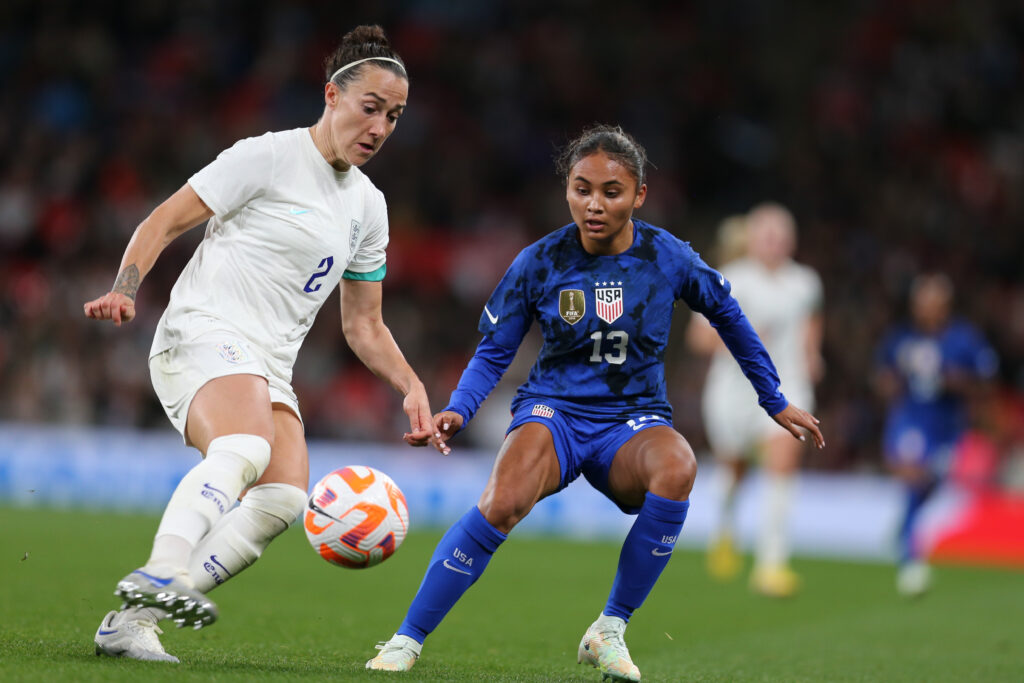
The USWNT and England's transatlantic rivalry
The history between the two standout international squads has fostered a fierce and friendly rivalry.
Saturday's match will be the 20th meeting between the pair, with the US holding the all-time with a 12-5-2 record. Their last showdown — a 2022 tilt at Wembley — ended in a 2-1 Lioness victory. However, the US won the pair's most recent world tournament battle by ousting England 2-1 from the 2019 World Cup.
"We’ve somehow created a rivalry across the ocean," England defender Lucy Bronze commented when the match was announced earlier this year. "We’re always excited when the US come over, the fans are as well.... I’m sure Wembley will be rocking."
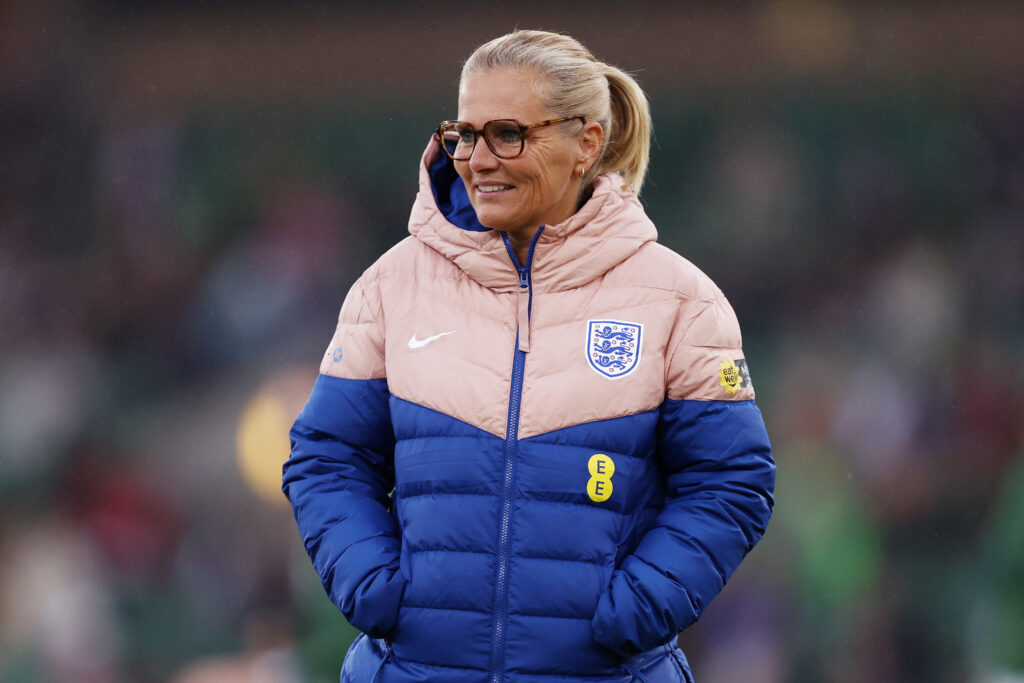
Two of the best bosses in the business
While the top-ranked rosters will star on Saturday's pitch, the sideline will feature two women who are arguably the best head coaches in the women's game — England's Sarina Weigman and the USWNT's Emma Hayes. Even more, both have ties to each of the contending countries.
Former Dutch national team player Weigman, who later coached the Netherlands to the 2017 European Championship and the 2019 World Cup final, spent a season playing in the US for the University of North Carolina. Alongside USWNT legends Mia Hamm and Kristine Lilly, she helped lead the Tar Heels to their 1989 NCAA Championship trophy.
England lured Weigman away from the Netherlands in 2021, making her the first non-British manager of the national team. She repeated the same success she had with the Dutch, with the Lionesses becoming 2022 Euros champs before advancing to the 2023 World Cup final.

USWNT boss Emma Hayes's triumphant return
As for Hayes, who grew up in London, her USWNT tenure is still only a few months old, but she cut her teeth stateside. Hayes coached in the US at the college and pro level, first with the USL and later in the folded WPS. After returning to England, she helmed Chelsea FC, building the club into the championship-winning behemoth it is today.
The return to her old stomping grounds is especially poignant for the 2024 Ballon d'Or Coach of the Year.
"Wembley’s like a second home to me, not just as a kid going there but as a manager [at Chelsea] I had a lot of success there," Hayes told reporters after the friendly was announced. "It’ll be amazing to go back, play 20 minutes from my house and play against some amazing players in England — I’m looking forward to it."
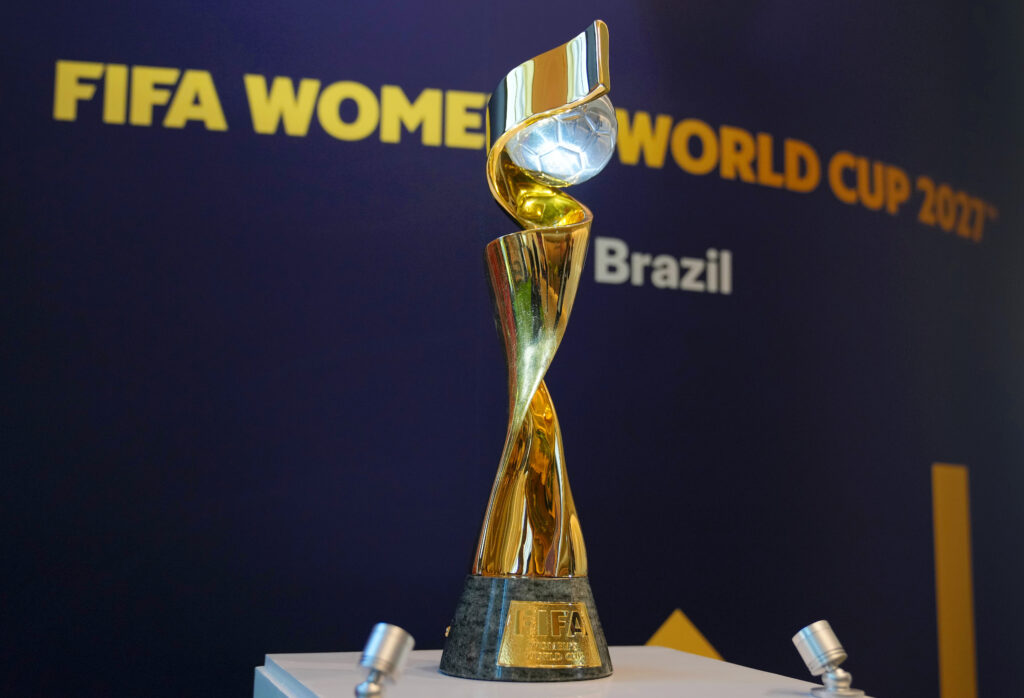
US, England eyeing future titles
Though the stakes in any friendly are always relatively low, a win on Saturday offers the victor a significant momentum boost as each look toward upcoming continental and world competitions.
Gearing up to defend their title in Switzerland next summer, the reigning European champs are aiming to bounce back after a 4-3 loss to Germany last month. Meanwhile, the US is already staring down the 2027 World Cup after earning Olympic gold in Paris last August.
"We're coming to win at the weekend," Hayes said ahead of Saturday's match. "But that’s not my overarching goal. I want to qualify for the World Cup and I want to win the World Cup."
How to watch the USWNT vs. England international friendly
The USWNT kicks off against England's Lionesses at 12:20 PM ET on Saturday, with live coverage on TNT.
Brazil has been named the host for the 2027 Women’s World Cup, with FIFA announced early Friday.
The decision came after a vote at the 74th FIFA Congress in Bangkok, with Brazil earning 119 votes to the joint European bid’s 78.
This will be Brazil’s first time hosting the Women’s World Cup, with the country having hosted the men’s World Cup twice before in 1950 and 2014. It will also be the first Women’s World Cup held in South America. The tournament will follow the same 32-team format as the 2023 WWC in Australia and New Zealand.
Brazil winning the bid was not entirely surprising after FIFA issued a report just last week, stating that the Brazilian bid had pulled ahead as host following technical inspection. After evaluation, Brazil was given a score of 4.0 out of 5, compared to the 3.7 awarded to the Germany, Belgium, and the Netherlands.
Brazil ranked higher in a number of key areas, including stadiums, accommodations, fan zones, and transport infrastructure. Though considered to be a frontrunner, the US and Mexico withdrew their joint bid prior to the technical inspection period, saying they would instead focus their efforts on 2031.
On Friday, Brazilian Football Confederation (CBF) president Ednaldo Rodrigues called it a "victory."
"We knew we would be celebrating a victory for South American women's soccer and for women," he told reporters. "You can be sure, with no vanity, we will accomplish the best World Cup for women."
"We are working on a transformation, not only for the country but for the continent," added bid team operational manager Valesca Araujo.
Brazil intends to use 10 of the venues utilized at the 2014 men’s World Cup, including holding the final in Rio de Janeiro on July 25th. The CBF's proposal outlines that the 2027 tournament run from June 24th through the end of July. Last summer’s World Cup began at the end of July and concluded on August 19th.
Another notable element of Brazil's newly unveiled plan to grow of the women’s game is that "all [men’s] clubs wishing to take part in high-level national and continental competitions must now provide a structure for a women’s team." While the definition of "structure" was not specifically identified, the country has set targets with CONMEBOL to help increase the number of women’s club teams in the country.
In last week's inspection findings, FIFA noted that selecting Brazil as the next WWC host could "have a tremendous impact on women's football in the region."
Brazil has officially become the favorite to host the 2027 Women's World Cup after FIFA’s technical inspection team awarded them a higher rating than the joint European bid.
After the US and Mexico dropped out of the running last month, the bid from Germany, Belgium, and the Netherlands had previously been pegged to win hosting rights for the next Women's World Cup. But FIFA's latest report shows that Brazil was given a score of 4.0 out of 5 in its technical evaluation, besting the European contender's score of 3.7.
Brazil ranked higher in a number of key areas, including stadiums, accommodations, fan zones, and transport infrastructure. The country is aiming to reuse 10 of the venues used for the 2014 Men's World Cup in 2027, with the final set to take place in Rio de Janeiro.
"The Bid Evaluation Report reflects the comprehensive evaluation model that has become a hallmark of FIFA’s enhanced bidding processes for men’s and women’s flagship events, which incorporates a variety of criteria, ranging from event vision and key metrics, infrastructure, services, commercial aspects, and sustainability and human rights," FIFA wrote in a press release.
The report also highlighted the fact that this would be the first Women's World Cup in South America, noting that the decision could "have a tremendous impact on women's football in the region."
Should the EU bid win, it wouldn't be the first WWC in Europe, as Germany played host to the event in 2011 before France in 2019. There could also be further complications for the Germany-Belgium-Netherlands bid: In its report, the evaluation team regarded the bid's legal and contractual framework as "high-risk."
FIFA has promised more planning time for the 2031 Women's World Cup. While the Men's World Cup hosts have already been secured through 2034, the WWC is only three years away with a host yet to be named.
The final vote is set to take place at the 74th FIFA Congress in Bangkok on May 17th. It will be the first time FIFA determines a World Cup host via an open vote.
The U.S. Soccer Federation, in conjunction with the Mexico Football Federation, submitted a joint bid to host the 2027 Women’s World Cup on Friday.
The bid’s tagline is “NEW HEIGHTS,” which includes a collective vision to “deliver a tournament with the world’s greatest players playing on world-class pitches in sold-out stadiums.”
As part of the bid, USSF cites infrastructure that “is already in place – including training facilities, match venues, base camps and travel accommodations – to deliver an excellent on-field product and top-level performance throughout the entirety of the tournament.”
In a release, U.S. Soccer president Cindy Parlow Cone called it a “pivotal time for women’s soccer.”
“Around the world, Federations are beginning to invest more and more in the women’s game and records are being rewritten for revenue, viewership, and participation,” Parlow Cone said. “The U.S. and Mexico are in a unique position to host a World Cup that will leverage the same venues, infrastructure, and protocols used for the Men’s World Cup just a year prior.
“As a result, we believe the time is right to host a FIFA Women’s World Cup that features a truly world-class experience for players and fans, alike. This will not only unlock the economic potential of women’s soccer, it will send a message to young players around the world that there is no limit to what they can achieve.”
The U.S. is set to host the 2026 Men’s World Cup alongside Mexico and Canada. The bid for the women’s tournament will utilize “key efficiencies” from that event to help their iteration of the event.
U.S. Soccer had previously announced their intention to submit a bid alongside Mexico. Belgium, Germany and the Netherlands submitted their bid on Friday, the deadline to do so, as well. Brazil had previously submitted their bid.
South Africa had put in a bid, but withdrew it in November.
There are still some obstacles in the way of a World Cup being played in the U.S. and Mexico, though. The World Cup has never been hosted by a South American country, making Brazil a high-quality bidder for the tournament. Germany, meanwhile, hosted a World Cup in 2011 and splitting the games between three countries would provide the infrastructure needed for the tournament.
Belgium, Germany and the Netherlands are submitting a bid to FIFA to host the 2027 Women’s World Cup, the countries’ football associations said Friday.
Brazil submitted their bid to host last month, while the United States and Mexico have also expressed interest.
Friday is the deadline for member associations to submit their bids to FIFA. South Africa had also submitted a bid, but withdrew that last month in favor of presenting a “well-prepared bid” for the 2031 World Cup.
“Extensive and detailed consultations between the three federations along with key stakeholders including central governments dates back to 2021,” the Dutch football federation (KNVB) said in a statement. “This has led to alignment around the belief that our three countries are well placed to stage a FIFA Women’s World Cup 2027 of unparalleled quality and impact.”
Bid cities for the countries’ bid include Brussels, the capital of Belgium; Amsterdam, the capital of the Netherlands; as well as Düsseldorf and Cologne Germany.
— Rich Laverty (@RichJLaverty) December 8, 2023
Brussels, Charleroi, Genk, Ghent
Amsterdam, Eindhoven, Heerenveen, Enschede, Rotterdam
Dortmund, Düsseldorf, Gelsenkirchen, Cologne
The confirmed bid cities for the @bng2027 World Cup as they submitted their official bid book to FIFA this morning.
FIFA will conduct on-site inspection visits to bidding countries in February. FIFA Congress will then appoint the 2027 World Cup hosts in May.
Germany has hosted the Women’s World Cup once before, back in 2011, after having won the 2003 and 2007 editions of the World Cup.
This year, Australia and New Zealand hosted the World Cup, which was won by Spain.


